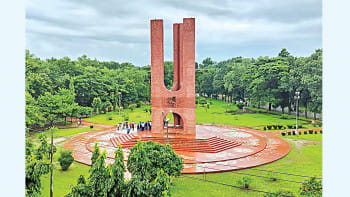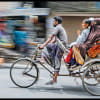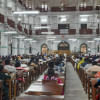No student should be at risk of death on their campus

We are deeply disturbed by the tragic death of a first-year student of Jahangirnagar University who was fatally injured after being struck by a battery-powered rickshaw on Tuesday evening. The passing of someone so young—that too in a place where they are supposed to be safe—is a stark reminder of the vulnerabilities that persist within our university grounds. According to a report, the victim, Afsana Karim (Rachi), was near the new Arts Building when the incident occurred. Despite being rushed to the university medical centre and later to a hospital in Savar, she succumbed to her injuries. Agitated students have since blamed the lack of adequate medical care and authorities' failure to regulate vehicle operations on the campus, calling it a "structural killing."
The sprawling JU campus is no stranger to padestrian collisions as it often attracts crowds driving cars and motorcycles from outside. The battery-powered rickshaw, commonly known as auto-rickshaw, has been a particular concern thanks to its fragile structure and unsustainably high speeds, posing safety risks to both passengers and pedestrians. In 2022, after another student was injured in a similar incident, students called for a ban on these vehicles but that did not materialise. Instead, the authorities attempted to regulate their use. Currently, there are 310 licensed auto-rickshaws. Drivers have to pay a combined fee of Tk 4,000 for registration and outfitting. However, unlicensed rickshaws often enter the campus which, combined with the lack of proper training and accountability for drivers, contribute to accidents.
In the wake of the latest tragedy, JU students staged protests including a daylong blockade at all university gates on Wednesday. Their key demands include justice for the death of Afsana Karim, installing adequate street lighting and speed bumps, functional CCTV cameras across the campus, improving emergency services at the medical centre, banning all unregistered vehicles, ensuring proper training and registration for drivers, etc. The authorities have already suspended four employees for negligence. While we hope they will do everything necessary to ensure a safer campus and restore confidence among students, the High Court's directive on Tuesday—banning battery-run rickshaws on Dhaka's streets within three days—has added a layer of complexity to the discussion surrounding battery-powered rickshaws.
It cannot be denied that the public sentiment is somewhat against such vehicles, with collisions being reported in many other places as well. But an outright ban, without offering viable alternatives for the drivers, risks pushing marginalised workers into deeper economic distress. A gradual phasing out, combined with opportunities for alternative employment, could help address this challenge more equitably. However, at JU, situated on the outskirts of the city, it is more urgent now to enforce strict regulations on the operations of such rickshaws and other motor vehicles and meet other demands of the students. No student should have to be at risk on their own campus.


 For all latest news, follow The Daily Star's Google News channel.
For all latest news, follow The Daily Star's Google News channel. 










Comments